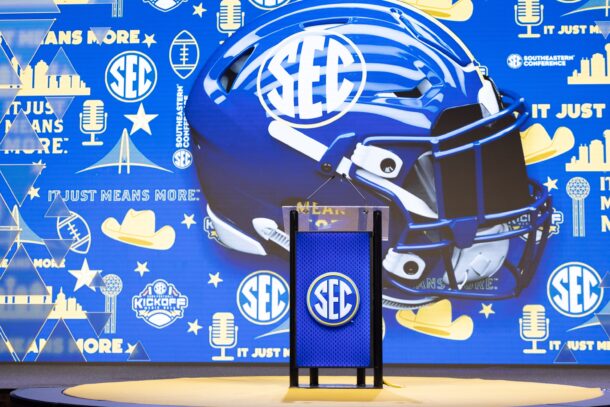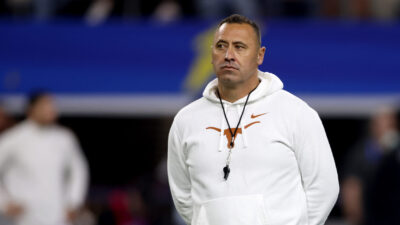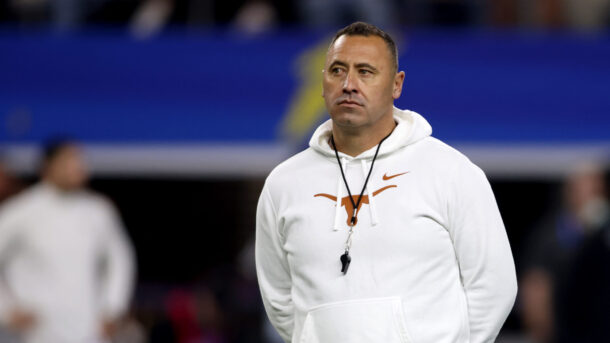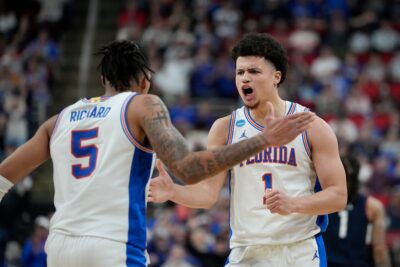Ad Disclosure

The perspective of a close family member certainly can shed additional light on an iconic sports figure we might think we already know pretty well.
So it is with Frank Broyles, whose granddaughter was gracious enough to tell us about her relationship with the Arkansas Razorbacks’ storied former coach and athletic director. Broyles passed away from complications of Alzheimer’s disease on Aug. 14 at the age of 92.
Beau Broyles is a senior at Arkansas. She will graduate in May with a degree in apparel merchandising and product development, plus a minor in marketing. She’s been involved with the Razorback Booster Club, was the vice president of the Razorback Foundation Collegiate Board and is currently the president of her sorority, Chi Omega. Born and raised in Fayetteville, she’s pretty much been a Razorback since birth.
Much has been written about Frank Broyles’ impact on Arkansas football, and on college football in general.
Beau Broyles tells us of the impact of the man away from the bright lights of an SEC football stadium, the impact of his faith and his love.
TR: I woke up to my dad knocking on my door my freshman year, telling me my grandpa had passed away in the night. As we speak, it’s barely been a week for you. Has his passing set in yet?
It’s going to be weird going to the first football game and him not being there.
BB: I knew it was going to happen, but I just didn’t know when. During those times, it was real. What he ultimately wanted from me was to push myself and be a leader. … Sunday (the day before Broyles passed) was an emotional day, but it was joyous in the sense that he has done so much in his life that we can be proud of. He wanted to be with the Lord and make this world a better place. … It’s going to be weird going to the first football game and him not being there.
TR: I know he contracted Alzheimer’s. What was your relationship with him like when the disease began to worsen?
BB: My grandmother, who I was named after, actually passed away from the same disease when I was in the third grade. From there, he started the Barbara Broyles Foundation (now Broyles Foundation) where he wrote a playbook teaching caregivers how to cope with love ones who have Alzheimer’s. As he got older, the dementia kind of kicked in, which was different, but I kind of knew what to expect. It was kind of weird going over there and him not knowing who I was, but from experience, I knew that was to be expected.
TR: I’ve been reading up on him a lot lately. Do you sometimes read something and learn something new about him that you didn’t know?
BB: I’ve learned different things that he has done on the field throughout my life, and in fifth grade I did a project on him. I actually got to sit down with him in his living room and hear everywhere he coached. That was the first time I really heard that. I feel like there is always something new to learn about him, which is really cool. That is what is cool about hearing from all these different players and people who used to work with him. I just viewed him as my grandpa that had this job, but then you realized that he touched so many people in different ways. It makes me want to be better wherever I am at currently in life.
TR: What kind of legacy do you want to leave at U of A?
BB: There’s always going to be a trial. He went through different ones every day. The kind of legacy he would put forth is that you have to keep pushing and keep going. In order to touch the lives of other people, you never stop, and keep working harder, even during the challenging times. And that is why I think he became such an inspiration. This is such a cool opportunity for me at Arkansas to leave the same legacy he did, to show the girls here that “yes, it might be difficult, but I’m also here for them.” I know that I could never be a football coach or athletic director, but I have some form of leadership on this campus, and I’d love to do anything similar to what he did. Being an athletic director comes with a lot of criticism. What people don’t realize is that he never had a bitter bone in his body. Instead, he chose to channel whatever negativity was coming his way into being better. He said to never hold grudges. God was making people say those things for a reason, and that was just to make him better. I need to approach my days like he did here on campus.
TR: How was your grandpa involved with your faith?
He really focused on how much the Lord did for him and how he couldn’t have done it without the Lord, and I firmly believe that too.
BB: All growing up, I went to Central United Methodist, and that’s where he went too. My dad would tell me he would have his games, fly to Little Rock to do a talk show and then he was always there the next Sunday morning for church in the same pew. We would go to Sunday school in the morning and then go to “big church with Pop.” He really focused on how much the Lord did for him and how he couldn’t have done it without the Lord, and I firmly believe that too. I think everyone has a time in their life where they are given an opportunity to be an example by faith. His opportunity just happened to be a little bigger than most people. If I can just live the way he does, how Christ is the center of all of it, then there is nothing to fear. Yes, there is disease and trials, but ultimately the Lord wants you lead people closer to him.
TR: Would he have been okay if you would have chosen another school?
BB: Funny story, I almost went to Alabama. I toured a couple of different places, but I really enjoyed Alabama. … I got into Ole Miss and Alabama, and really wanted to tour Georgia, but he went to Georgia Tech and that was his rival. I told him that I was thinking about those schools and asked him what he thought I should do. Instead of talking negatively about the other schools, he suggested I choose Alabama because it’s the most central to the big golf courses, which was funny. A couple weeks before (high school) graduation, I decided to go to Arkansas. I was thinking about going somewhere else just to be a regular student somewhere, but it would be so sad to see all of my friends from high school walk in the same steps that he did on this campus. Why would I not? I don’t regret it a single day. I can’t imagine not being here with all of the support I feel.
TR: Biggest thing you’re going to miss about him?
BB: I think just maybe his advice. Even when his Alzheimer’s progressed, he could remember things that happened forever ago.
He could remember games down to the second and what he was thinking to that moment, like the exact play he was calling.
He could remember games down to the second and what he was thinking to that moment, like the exact play he was calling. It was something that kind of put you in awe of him. He wasn’t going to sugarcoat anything and told you how it had to be. We used to always go golfing, and he taught me how to hit my first golf club, which is what I ended up doing in high school. I actually got the opportunity to play Augusta one time with him. I think it’s cool that he left a legacy here that I don’t think anyone is going to forget anytime soon, and people talk about him like he’s still here. His favorite thing to say was that he had a charmed life, and I was just lucky to be a part of it.
TR: What’s a story about him most people wouldn’t know that you would like to share?
BB: I’ll miss how much he wanted to go to the Catfish Hole because it was his favorite restaurant. We loved it. We had a Broyles family Christmas every year, which he loved. I’m one of 14 grand kids. My “bebe” had this special Georgia fudge she would make with pecans. One of my favorite things was cracking pecans with him. Also, he never missed a sporting event for any of us. “Pop” loved getting to go to all of our games and gave us advice to “be betta.” He loved watching all of his grand kids succeed.
Photo courtesy of Beau Broyles
Tye is a contributing writer for Saturday Down South. He works on-air for ESPN Arkansas in Fort Smith. You can follow him on twitter @TyeSportsRadio.




